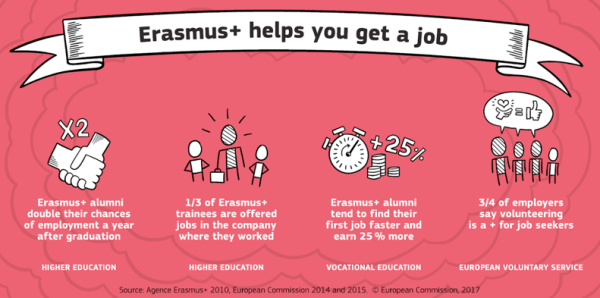Module 1: Why learning mobility
EXPECTED LEARNING OUTCOME: You will be able to argument how learning mobility can help your client group develop skills that are in demand on the labour market
3. Skills gained by learning abroad
3.2. Future employment
 Student mobility is seen by the European Commission as one of the solutions to address the skills gap in Europe: “Increasing the mobility of students and graduates may be crucial to developing Europe’s skilled labour force in order to strengthen its position as a knowledge-based economy. The literature argues that competition for global talent has become a vital route to enriching the stock of human capital available in a country. Student mobility is one of the options for attracting this global talent, under the ‘academic-gate approach’. This is aimed at drawing from the pool of foreign students, having them graduate from local educational institutions and encouraging them to stay and work afterwards in the destination country.” (European Commission, Education and Training Monitor 2018).
Student mobility is seen by the European Commission as one of the solutions to address the skills gap in Europe: “Increasing the mobility of students and graduates may be crucial to developing Europe’s skilled labour force in order to strengthen its position as a knowledge-based economy. The literature argues that competition for global talent has become a vital route to enriching the stock of human capital available in a country. Student mobility is one of the options for attracting this global talent, under the ‘academic-gate approach’. This is aimed at drawing from the pool of foreign students, having them graduate from local educational institutions and encouraging them to stay and work afterwards in the destination country.” (European Commission, Education and Training Monitor 2018).
As the 2019 article "Developing Guidance Competences for Learning Mobility" (Launikari et al, 2020) sums up:
"Evidence also shows that studying and living abroad positively affects individuals’ future career opportunities and makes them readier to work in an internationally competitive labour market than non-mobile young people. Other studies suggest that individual motivation and readiness for overseas studies, intercultural learning and skills development while living abroad may benefit individuals’ employment.”
Moreover, individuals with international experience tend to run a reduced risk of long-term unemployment, earn higher salaries and have more responsibility in their professional lives than those without it. For example, Swedish exchange students are employed and integrated in the labour market to a greater extent and have higher average income than those who have studied only in Sweden.
